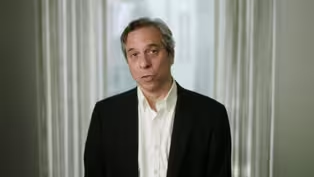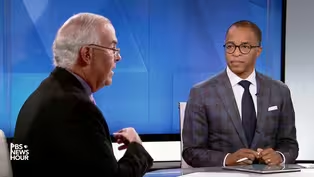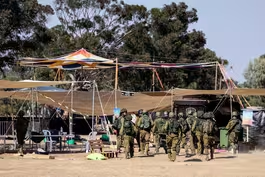
‘Invisible Generals’ tells story of 1st Black U.S. generals
Clip: 11/10/2023 | 7m 45sVideo has Closed Captions
‘Invisible Generals’ chronicles little-known history of 1st Black U.S. generals
A new book explores and honors the legacy of two exceptional American veterans whose contributions have gone largely unknown, until now. In “Invisible Generals,” author Doug Melville recounts his family history and tells the barrier-breaking stories of the country’s first Black generals. He joins Geoff Bennett to discuss the book and what inspired him to write it.
Problems playing video? | Closed Captioning Feedback
Problems playing video? | Closed Captioning Feedback
Major corporate funding for the PBS News Hour is provided by BDO, BNSF, Consumer Cellular, American Cruise Lines, and Raymond James. Funding for the PBS NewsHour Weekend is provided by...

‘Invisible Generals’ tells story of 1st Black U.S. generals
Clip: 11/10/2023 | 7m 45sVideo has Closed Captions
A new book explores and honors the legacy of two exceptional American veterans whose contributions have gone largely unknown, until now. In “Invisible Generals,” author Doug Melville recounts his family history and tells the barrier-breaking stories of the country’s first Black generals. He joins Geoff Bennett to discuss the book and what inspired him to write it.
Problems playing video? | Closed Captioning Feedback
How to Watch PBS News Hour
PBS News Hour is available to stream on pbs.org and the free PBS App, available on iPhone, Apple TV, Android TV, Android smartphones, Amazon Fire TV, Amazon Fire Tablet, Roku, Samsung Smart TV, and Vizio.
Providing Support for PBS.org
Learn Moreabout PBS online sponsorshipGEOFF BENNETT: This Veterans Day weekend, Americans across the country will honor those who have served our nation in uniform.
A new book explores the legacy of two exceptional veterans whose contributions have gone largely unknown until now.
Author Doug Melville recounts his family history and tells the barrier-breaking stories of father and son Benjamin O. Davis Sr. and Jr., the country's first Black generals.
He recently told me how watching the movie "Red Tails," George Lucas' 2011 film about the Tuskegee Airmen, inspired him to write the book "Invisible Generals: Rediscovering Family Legacy, and a Quest to Honor America's First Black Generals."
DOUG MELVILLE, Author, "Invisible Generals: Rediscovering Family Legacy, and a Quest to Honor America's First Black Generals": So, I was invited to a screening, an advanced screening of the movie "Red Tails."
And when the commander of the "Red Tails" came out on screen, it was played by actor Terrence Howard.
But while I was thinking that they were going to say General Colonel Davis, who was commanding the Tuskegee Airmen, the name that they used was Colonel Bullard.
I was quite upset about it.
I went home, I tell my dad, I was furious, and he said: "If you think changing the names are bad, why don't I tell you the full family story?"
And he shared with me the story of the invisible generals.
I was so inspired, Geoff, that I immediately said, I have to be the one to bring this story to the world so the true heroes can get their stories out into the universe.
GEOFF BENNETT: And Benjamin O. Davis, Sr. and Jr., obviously, they were father and son.
And at the start of World War II, there were 335,000 Americans who were enlisted in the U.S. armed forces.
But there were only two Black officers, the Davises.
DOUG MELVILLE: Yes, so Ben Davis Sr. in 1901 was elevated to officer by President McKinley.
He then started his family.
His wife dies in childbirth.
He brings his son to go for a plane ride in a barnstorming traveling airplane exhibit.
And he comes down from that ride and goes: "Daddy, I want to be a pilot."
And Ben Sr. said: "I will help you live your dream."
And that was when he started training Ben Davis Jr. to go through what it would take to graduate from West Point.
Because of segregation, Ben Sr. knew that, unless it was through graduating at the top of West Point, his son would never get the opportunity to live his dream.
So he sells the family house in Washington, D.C., relocates to Illinois, so he can get the signature of the only Black congressman in the United States, Oscar De Priest.
And then they enter West Point Military Academy without them knowing he was Black.
And this was in 1932.
GEOFF BENNETT: And when Ben Davis Jr. was at West Point, he was obviously the only Black cadet.
He was ostracized.
He was ignored as a matter of policy.
How did he cope with that?
DOUG MELVILLE: Well, this is really the mental fortitude and leadership that makes me feel he was the greatest general and greatest West Point grad of all time.
When the cadets realized and the administration realized that they had let a Black cadet into West Point, immediately, they said, we will silence him until he drops out.
Ben Jr. called Ben Sr. and said: "Dad, I know they're going to silence me."
And he said: "Son, there's eight million Blacks on the outside world that are rooting for you.
Put a date on the wall of graduation in 1936 and no matter what anybody does to you, make sure you graduate at the top third of the class."
Four years went by, no human interaction outside the line of duty.
No one talked to him.
No one spoke to him.
He couldn't eat at the tables with other cadets because he wasn't getting the permission to sit.
Yet, he was able to still graduate in the top third of his class in the class of 1936.
GEOFF BENNETT: And fast-forward to the time when FDR was trying to get reelected.
He called up Benjamin Davis Sr. for advice.
And that is what gave rise to the Tuskegee Airmen?
Is that right?
DOUG MELVILLE: That's exactly right.
FDR assigned Ben Davis Sr. as the head of Negro policy in the military so he could work with him directly.
When asking Ben Davis Sr. how he could get the Black vote, as he was the highest-ranking Black in the military, he said: "You must ensure equal opportunity for black and white Americans in the United States.
And in the military, you must ensure equal opportunity by allowing Blacks to fly airplanes, which at that time was not something that was allowed to do."
And when FDR told Ben Sr., "Who would lead that if that was something that I decided to do?"
and Ben Sr. said, "My son."
His son would then go down to Tuskegee, and that would be the start of the Tuskegee Airmen that we all know and are familiar with.
GEOFF BENNETT: That's incredible.
Benjamin Davis Jr., when he retired from the military, he had just a consequential second act.
Tell me more about that.
DOUG MELVILLE: When Ben left the military in 1970, he couldn't get a job in the private sector as a pilot.
No one would hire him, because some of the evil segregation rules were still de facto in place in the private sector.
So the government created a special assignment role in the Department of Transportation Aviation.
And the first assignment the assignment was, how can we get commercial travel in aviation as safe as military travel in aviation?
There were a lot of hijackings and skyjackings at that time and people were starting to figure commercial travel.
So what he decided to do was implement national airport security for your baggage and for your person, which is exactly what we see today in every airport worldwide.
He also led the development of the air marshal program and trained 4,000 officers.
That then led to the Carter administration, and that was where he led the creation of the federally mandated 55-mile-an-hour speed limit.
And his name actually was called Mr. 55 at the Pentagon.
(LAUGHTER) GEOFF BENNETT: I will tell you, Doug, since this book landed on my desk, I keep coming back to a picture in here of Benjamin Davis Jr. and his wife of 60-plus years, Agatha, because what is so striking to me is that their grace, their strength, and their dignity comes through.
It was amazing that they were able to succeed and thrive and contribute so much to this country under conditions that were set up for their failure.
DOUG MELVILLE: Yes, Ben always lived by one thing that he would tell me over and over: "Doug, you have to use the system to defuse the system.
You cannot complain about something and fix something at the same time."
So if you want to evolve a policy, if you want to evolve a practice, the first thing is, you have to be part of the organization, then build a voice, then get a vote, and then, over time, the impossible may seem long, but, in time, you can accomplish the impossible.
GEOFF BENNETT: The book is "Invisible Generals."
It's about Benjamin Davis Sr. and Jr. Doug Melville, you did right by them both.
DOUG MELVILLE: Thank you so much.
A Brief But Spectacular take on how to rebuild local news
Video has Closed Captions
Clip: 11/10/2023 | 3m 12s | A Brief But Spectacular take on how to rebuild local news (3m 12s)
Brooks and Capehart on takeaways from the 2023 elections
Video has Closed Captions
Clip: 11/10/2023 | 11m 28s | Brooks and Capehart on 2023 election takeaways and Manchin’s Senate shakeup (11m 28s)
High demand for new RSV drug for infants outpaces supply
Video has Closed Captions
Clip: 11/10/2023 | 5m 49s | High demand for new RSV treatment for infants outpaces national supply (5m 49s)
Israel-Hamas war takes deadly toll on journalists
Video has Closed Captions
Clip: 11/10/2023 | 6m 4s | Israel-Hamas war takes deadly toll on journalists covering the conflict (6m 4s)
Survivors, rescuers recount horrors of Hamas festival attack
Video has Closed Captions
Clip: 11/10/2023 | 8m 7s | Survivors, rescuers in Hamas music festival attack recount the day’s horrors (8m 7s)
Thousands flee Gaza hospitals as Israeli troops close in
Video has Closed Captions
Clip: 11/10/2023 | 4m 27s | Thousands of civilians flee northern Gaza hospitals as Israeli troops close in (4m 27s)
Providing Support for PBS.org
Learn Moreabout PBS online sponsorship
- News and Public Affairs

FRONTLINE is investigative journalism that questions, explains and changes our world.

- News and Public Affairs

Amanpour and Company features conversations with leaders and decision makers.












Support for PBS provided by:
Major corporate funding for the PBS News Hour is provided by BDO, BNSF, Consumer Cellular, American Cruise Lines, and Raymond James. Funding for the PBS NewsHour Weekend is provided by...





